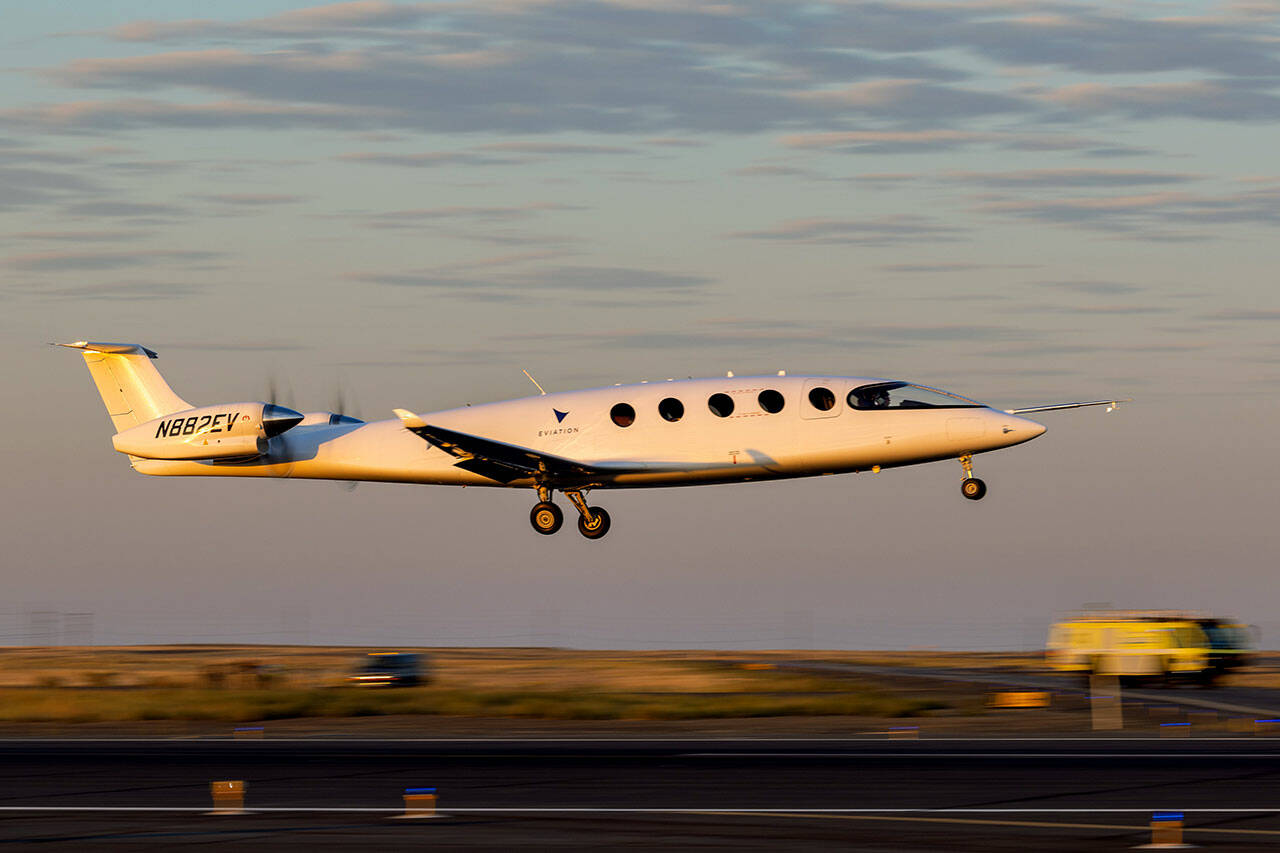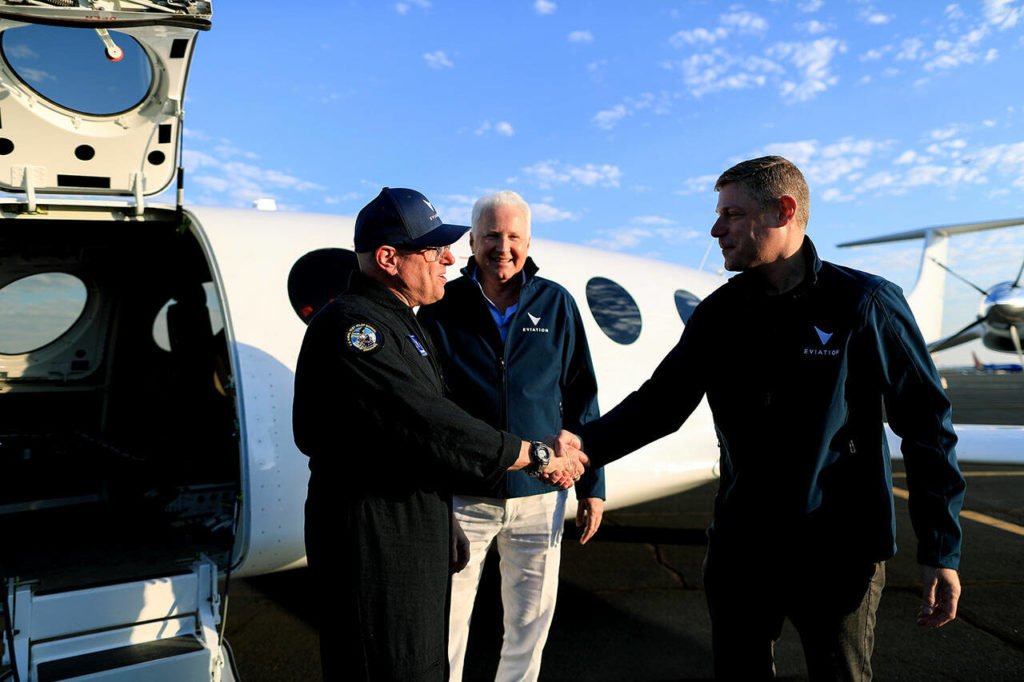MOSES LAKE — Up, up and away! With a pale blue sky above and watchful eyes below, an Arlington company’s all-electric commuter airplane regally took its first test flight Tuesday morning, circling the Grant County International Airport in Moses Lake for about eight minutes.
Eviation Aircraft’s nine-seat passenger plane, a clean sheet design built from the ground up, left the runway at 7:11 a.m. and landed eight minutes later at 7:19 a.m.
Hundreds of viewers, in-person and online, watched as test pilot Steve Crane guided the sleek white plane, known as Alice, through a series of gentle turns above the airport at an altitude of 3,500 feet at a speed of 171 miles per hour.
A live video feed followed the Arlington-built, twin-engine prototype through its relatively short but historic inaugural flight.
Eviation officials and others gathered around the battery-powered plane — tail number N882EV — after the flight to congratulate Crane.
“The aircraft flew beautifully and handled just like we thought it would — very responsive, very quick to the throttles and it came on in for a wonderful landing,” Crane told a beaming Gregory Davis, Eviation’s CEO.
“What we have just done is made aviation history,” Davis said.
The plane produces no carbon emissions.
“This is about changing the way that we fly. It’s about connecting communities in a sustainable way,” Davis said.
Tuesday’s flight was to validate the plane’s technology and test the propulsion system, battery power plant and the fly-by-wire system.
“This was the proof that the aircraft will work together,” Davis said at a press conference afterwards.
Challenges still loom.
For any electric airplane, not just Alice, the development of smaller, lighter batteries that can store more energy is a critical factor, Davis said.
Jet fuel provides about 40 times more energy than a battery of the same weight.
Therein lies the rub. The weight of the batteries needed to power an aircraft can restrict its flight range, or at certain thresholds, render it too heavy to take off.
A Boeing 747 would require 1.2 million pounds of today’s batteries “to generate the power of the (one) jet engine it would be replacing,” Emily Pickrell, University of Houston Energy Fellow told Forbes last year. A 747’s maximum take-off weight is about 900,000 pounds. Replacing the jet’s four engines with batteries, would require an “additional eight jet planes just to carry that weight!” Pickrell said.
For now, smaller commuter aircraft are the focus of electric aviation’s developers.
“We need the battery technology to mature for the plane to be satisfactory to our market need,” Davis said. He called on battery engineers and manufacturers to turn their attention to the aviation industry and develop aircraft-specific battery systems.
Still, Alice’s successful test flight bodes well for Snohomish County’s aviation industry.
Eviation continues to expand its Arlington footprint, a buildout that’s expected to include a manufacturing and assembly facility, Davis said Tuesday.
There are 137 orders for the plane.
“This is an amazing achievement, but this is just a milestone in terms of where we’re headed now,” Davis said. “Over the next several years we’re going to be developing and producing aircraft that satisfy our commuter market and ecological market and executive market for this aircraft.”
U.S. Rep. Rick Larsen, D-Everett, who attended Tuesday’s Moses Lake test flight, said Eviation and other aerospace companies could provide a foundation to build a broader aviation eco-system in Washington — one that includes the design and manufacture of environmentally sustainable aircraft and aircraft fuels.
“Aviation is changing in the U.S.,” Larsen said. “The U.S. Congress and the Federal Aviation Administration need to be prepared to support the use of these new technologies. If we don’t, other governments will and we’ll be left behind.”
Eviation unveiled its design for the production version of Alice a year ago.
Designed to fly about 280 miles on a single charge with a top cruising speed of 300 mph, the company says the commuter plane will operate in all environments served by piston and turbine aircraft.
About one-third of all commercial flights are less than 250 miles. Alice is geared toward passenger and cargo flights of one or two hours duration. The goal is to fully recharge the plane in 35 minutes.
Constructed from composite materials and weighing 16,500 pounds, half the plane’s weight is accounted for by two battery packs that power the electric propulsion system.
The plane’s propulsion system is another Snohomish County-sourced component.
Alice is fitted with two magni650 electric motors, each providing 640 horsepower. They are built by magniX, an Everett company that builds electric propulsion systems for aircraft.
Eviation and magniX, which teamed up to design the new plane, moved to Snohomish County last year.
Eviation leases three hangars at the Arlington Municipal Airport. There, the Israeli-based company designed and built the battery-powered prototype.
magniX relocated from Redmond and Australia to an office and research facility near Paine Field. Last year, the firm took home a $74 million grant from a NASA program to advance electric propulsion technology for commercial airline use. It is one of two U.S. companies selected to support the space agency’s Electric Powertrain Flight Demonstration program.
Both are subsidiaries of the Clermont Group, a private investment firm based in Singapore.
Earlier this year, Eviation trucked the plane to the Grant County airport to conduct high speed tests and prepare for its inaugural flight.
Alice was slated to make the flight from the Arlington Municipal Airport this year, but safety considerations prompted the move, Eviation CEO Davis said.
Moses Lake is a center for flight testing. Boeing, Mitsubishi and other aerospace companies have conducted test flights at the Grant County airport, Davis said.
The runway at Arlington’s airport is 5,400 feet by 100 feet. The runway in Grant County is more than twice the length: 13,000 feet long and 200 feet wide.
Eviation has said it plans to bring the plane back to Arlington to conduct more tests.
“It was a team effort and the team really came together. What a great, beautiful aircraft,” Davis said. “What’s amazing is what’s going to come next with proof that we can make a system fly the way we’ve just done with Alice. We are getting ready to enter into the market.”
Cape Air, one of the nation’s largest commuter airlines, signed a letter of intent this year to buy 75 of the all-electric planes. GlobalX, a Miami-based provider of passenger and cargo charter jets, is also on the books for 50 of the Eviation Alice model. Last year the global package delivery firm DHL ordered 12 planes, a cargo variant with a payload capacity of 2,600 pounds.
Eviation is not revealing the cost of the airplane, except to its customers, CEO Davis said.
Alice must pass muster with federal regulators to be certified for commercial use by the Federal Aviation Administration, a process that could take years, Davis said.
Eviation aims to certify the plane by 2025 and begin deliveries to customers by 2027. But the timeline is tethered to the pace of battery advances, Davis said.
“If the battery technology does what we think it will do, it will be 2027 for deliveries,” Davis said. A breakthrough in the technology would accelerate the delivery date, he added, while a lag would extend the date.
The first electric airship flight took place in 1883, when two French brothers attached an electric motor to a dirigible and flew above a Paris suburb for an hour.
It wasn’t until 1973 that a manned electric airplane, a converted motor glider, took off for a 12-minute flight in Austria.
Now, the race is on to reduce or eliminate the airline industry’s reliance on conventional petroleum-based fuels.
Aviation is responsible for 9% of transportation emissions in the United States and 3% of the nation’s greenhouse gas production, according to the Environmental Protection Agency.
So far, electric-, hybrid- and hydrogen-powered aircraft have emerged as the most promising technologies.
In October 2021, the International Air Transport Association, a trade group that represents more than 200 of the world’s largest airlines, committed to net-zero aircraft emissions by 2050.
A month later, the FAA released the United States Aviation Climate Action Plan, a policy guide aimed at achieving net-zero emissions throughout the airline and airline manufacturing industries by 2050.
Janice Podsada: 425-339-3097; jpodsada@heraldnet.com;
Talk to us
> Give us your news tips.
> Send us a letter to the editor.
> More Herald contact information.



























